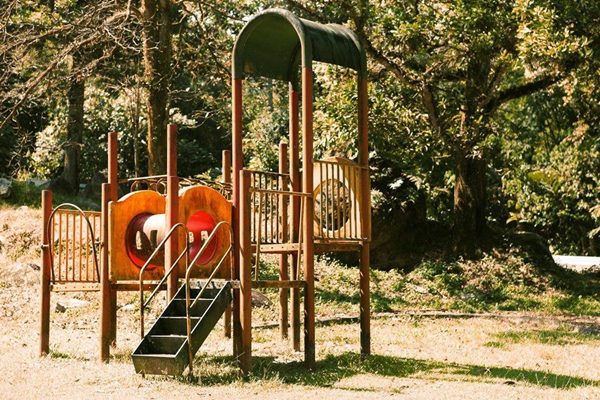Children will want a play area that is intriguing and adventurous. Parents want a play area that will be safe for their children. This can make for a conflict of interest which may not be easy to resolve in a playground design.
So how do you come up with a happy medium? Read on to find out.
Creating a Challenging Playground Design
A playground is more than just a place where a child can burn off excess energy. It is a place where they can develop skills including self-regulation and the handling of stressful situations while increasing self-confidence and self-esteem. When they come to a park, they need to feel challenged by the apparatus and atmosphere the play area provides.
If the play area does not catch their interest, they won’t be as likely to play there. Research shows that limiting challenging elements and enforcing too many restrictions on children can also hamper their development.
If children are exposed to too many circumstances where challenge and risk are restricted it can lead to obesity, mental health issues, a lack of independence and a hampering of learning and perception.
It can also make them more prone to fear. For instance, apparatus that allows them to climb will acquaint them with a healthy sense of heights. Without this sort of stimulation, they may develop a phobia that can continue to be a factor as they age.
So, we can see how important it is to create a design that will pose a challenge to children. But we need to create this design while keeping safety in mind. This is a task that is difficult, but it is not impossible.
Creating a Safe Playground Design
One important step to take in creating a playground that is safe and challenging is to make sure the equipment you use complies with safety codes.
There are several organizations like the International Equipment Manufacturers Association, the Consumer Product Safety Commission and the American Society for Testing and Materials, whose job it is to make sure playground equipment is safe for children. Any equipment used should be thoroughly tested before it is installed in the space.
And while equipment must be up to safety codes, it must still be challenging to children. Apparatus like a sturdy playground net, rock style facades and zip lines that are placed at a safe height can provide the appropriate challenges and still follow safety guidelines.
Another consideration you should take into account in keeping your park safe is to make sure there are areas nearby where adults can supervise. Be sure to provide shady benches around the play area where adults can sit and watch children while they are at play.
Finally, make sure the apparatus you install can accommodate plenty of children. This will reduce overcrowding which can be dangerous, particularly when children are climbing or playing at elevated heights.
Playground Safety Factors
In addition to making sure that the apparatus you use in your play area is safe, there are certain rules and regulations a designer must take note of to ensure that children are protected. These include the following:
Age Appropriateness: The Consumer Products Safety Commission recommends separate play areas for children that are 6 to 23 months, 2-5 years old and 6-12 years old.
Proper Installation: Installation of equipment must be performed by a trained professional. You can also recruit volunteers from a community build project.
Environmental Conditions: The play area must be designed so that it is protected from sun exposure, is well drained, is visible from nearby paths, is far from automobile and bicycle traffic and is separated from water and other natural hazards.
Equipment Design: All equipment used should be structurally sound and up to code.
Layout: The way children play can affect the use of the play environment. It is best to consult a Landscape Structures Consultant like Miracle Playsystems. He or she can help you design a layout that will provide accessibility and minimize congestion while children are playing.
Protective Surface: We all know how likely it is for children to fall while they are playing. That’s why a protective surface is necessary. This can be a loose material that is filled to a depth that will provide somewhat of a cushion. Wood fiber rubber mulch, factory made resistant tiles, a unitary safety surface or a combination of the three are all acceptable.
You may want to provide even more padding near equipment children are likely to fall off of.
Safety Audits and Inspections: Audits and inspections should be conducted regularly to make sure the play area and its equipment is safe and was not compromised by any wear and tear or damaged by vandals.
Creating a playground design that is both safe and challenging can be difficult, but if you consider the safety factors involved as well as how to keep children stimulated, your design will be a successful one. Taking all circumstances into account will help you come up with a play area that will be an asset to the community and the families that live there.
